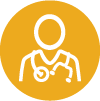According to the Centers for Disease Control, the two greatest risk factors for developing breast cancer are being a woman and being over 50 years old. However, some people develop breast cancer without any known risk factors and others do not develop the disease despite having several of them.
Another important thing to consider is that not all risk factors have the same impact on your health and well-being. If you feel you are at risk of breast cancer, the most important thing you can do is speak to your family doctor and get regular screenings.
Other Known Risk Factors of Breast Cancer
Besides age and gender, the Centers for Disease Control reports several other risk factors associated with breast cancer. These include:
- Inherited genetic mutation: A defect in the gene BRAC1 or BRAC2 increase the risk of developing breast cancer as well as ovarian cancer.
- Family history of breast cancer: A woman whose mother, daughter, or sister had breast cancer has a higher likelihood of developing the disease herself. This is true even when only one first-degree relative had breast cancer, even if that person is a male. The odds also go up when multiple family members such as a grandmother or aunt on either the mother’s or father’s side of the family had a breast cancer diagnosis.
- Early menstrual period or late menopause: The odds go up for women who began menstruating before age 12 or who did not stop menstruating until after age 55. Longer exposure to the estrogen hormone is the reason for the increased risk.
- High body weight and/or lack of physical activity: Overweight and obese women, as well as those who lead a sedentary lifestyle, have a higher risk of developing breast cancer than active women at a normal weight.
- First pregnancy after age 30 or no full-term pregnancy: Starting a family later in life, never getting pregnant, or never sustaining a pregnancy for the full nine months all increase the risk of developing breast cancer.
- Long-term use of oral contraceptive pills: Some birth control pills can interfere with normal hormone functioning and cause a woman to have a higher risk of being diagnosed with breast cancer later in life.
- Undergoing hormone therapy for more than five years: Some women take hormone replacement pills during menopause to replenish declining levels of hormones. The breast cancer risk is highest when women take the replacement hormones estrogen and progestin at the same time.
- High breast density: When a woman has dense breasts, she has more connective tissue and less fatty tissue. The reason this increases breast cancer risk is that tumors are harder to spot on a mammogram. This allows them to grow unchecked before she receives a correct diagnosis.
- History of breast cancer and non-cancerous diseases of the breasts: Unfortunately, people who have successfully fought breast cancer one time are more likely to have a recurrence than those who never had it at all. Certain breast diseases, such as lobular carcinoma in situ or atypical hyperplasia, have been linked to breast cancer.
- Heavy use of alcohol: Although casual drinking has no effect on breast cancer, excessive intake of alcohol increases the risk.
- Prior medical treatment using radiation therapy before age 30: Radiation therapy directed at the breasts or chest for treatment of conditions like Hodgkin’s lymphoma increase the chances of developing breast cancer later. This is particularly true for those who received radiation therapy before their 30th birthday.
- Use of the drug diethylstilbestrol (DES): Pregnant women who took this drug between 1940 and 1971 to prevent miscarriage have a higher likelihood of developing breast cancer. Women and men exposed to DES in utero have a higher risk as well.
The Centers for Disease Control also indicates that exposure to cancer-causing chemicals, smoking, and long-term night shift work can increase the risk of breast cancer. However, the cause and effect is not as well-known as it is with the above risk factors.
Control What You Can
While you obviously cannot change genetics, several of these risk factors are in your control. Quitting smoking, drinking alcohol in moderation, and leading an active lifestyle are just some of the things you can do to reduce your risk of breast cancer. The Cecil B. Highland, Jr. & Barbara B. Highland Cancer Center at UHC is here to support you in any way that we can.
Please note, the information provided throughout this site is not intended or implied to be a substitute for professional medical advice, diagnosis or treatment. All content, including text, graphics, images, and video, on or available through this website is for general information purposes only. If you are experiencing related symptoms, please visit your doctor or call 9-1-1 in an emergency.

